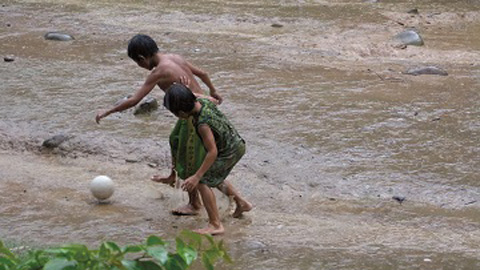Social relations, success in hunting and good health: sources of happiness

26/01/2017
An ICTA-UAB study led by Dr. Victoria Reyes-García reports that some socio-economic development policies in the Global South, especially those not designed according to local culture, might negatively impact wellbeing in unforeseen ways.
Socio-economic development projects in indigenous and rural communities in the Global South might have a negative impact on the happiness and wellbeing of the local population, which values social relations, health and success in subsistence activities over economic income.
This is what emerges from a study by scientists at the Institute of Environmental Science and Technology of the Universitat Autònoma de Barcelona (ICTA-UAB) led by Dr. Victoria Reyes-García which analyses the factors influencing happiness among rural and indigenous people. The research was based on the analysis of three indigenous societies in Borneo, the Congo Basin and Amazonia.
With one million Euros in funding through a Starting Grant awarded to Dr. Victoria Reyes-García by the European Research Council (within the Seventh Framework Programme of the European Union), the project was based on an in-depth study of these three indigenous societies over a period of five years, in order to gain greater insights into their specific conception of happiness (as a synonym of wellbeing and life satisfaction), which until now has been studied mainly from a Western perspective. As market economies expand throughout rural societies, the study aims to know the extent to which globalization and access to market goods could impact the quality of life of rural and indigenous peoples from the Global South.
Although absolute incomes are well valued by indigenous people, they are pushed into the background when assessing their level of wellbeing. Their sense of happiness centres on activities such as spending time with family or receiving visitors, on success in common subsistence activities such as hunting and fishing, and on health. "Income might relate to wellbeing only until a consumption satiation point is reach, where all basic needs are met; beyond this threshold, income is unlikely to increase wellbeing", explains Dr. Victoria Reyes-García and remarks that the pursuit of income generating activities deprives individuals from devoting time to those activities that make them happy, such as socializing and subsistence activities.
To fulfil basic human needs, governments invest resources in different types of social services and development programs, such as raising incomes, providing universal education and health care, especially among people with low levels of income. However, these initiatives might also negatively impact wellbeing, especially if development programs are not designed according to local cultures.
For example, schooling programs which are not contextualised can lead young individuals to give up traditional activities (hunting, finding and using medicinal plants), resulting in a loss of local environmental knowledge and subsistence skills, which are some of the main sources of happiness. It is not just about making education available to everyone, but also to develop culturally-sensitive educational systems.
Researchers also found that village-level income inequality might impair upon wellbeing in a different way than country-level income inequality. At the country-level, income inequality is associated with improvement opportunities, whereas at the village-level, income inequality might have negative effects such as envy, thereby reducing wellbeing.
Dr. Reyes-García emphasizes that "policies with a narrow focus on raising income levels can potentially have unexpected consequences for wellbeing if they do not take into consideration income distribution". The research concludes that although happiness seems to be universal, some of its drivers vary according to culture. The study provides alternative views of the concept, with the potential to inform and guide general wellbeing policies. In order to conduct the research, the members of the research group lived for 18 months with the communities of the Punan Tubu (hunter-gatherers of Borneo, Indonesia), the Baka (semi-nomads from the Congo River basin) and the Tsimane' (forager-horticulturists from the Bolivian Amazonia). On completing this project (The Adaptive Nature of Culture: A cross-cultural analysis of the returns of Local Environmental Knowledge in three indigenous societies"), the group issued a comprehensive report with the principal conclusions drawn in Spanish, English and French.